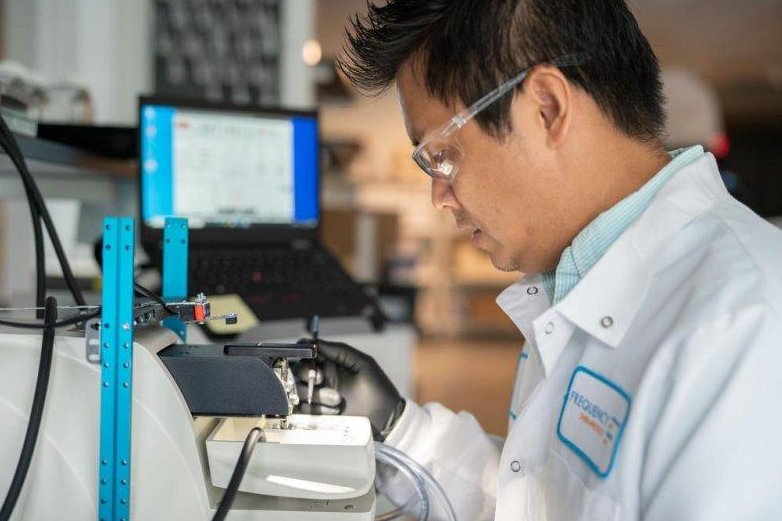Frequency Therapeutics announced Monday it will scrap development of a drug called FX-322, after testing failed to show improvement in speech perception in people with noise-induced sensorineural hearing loss. Photo courtesy of Frequency Therapeutics
Feb. 13 (UPI) -- Regenerative medicine company Frequency Therapeutics announced Monday it will scrap development of a drug called FX-322, after testing failed to show improvement in speech perception in people with noise-induced sensorineural hearing loss.
"This was a rigorous and well-designed study that provided us a clear outcome, though not the outcome we wanted. Given these disappointing results, we will cease further development of the company's drug candidates for hearing loss," Dr. Chris Loose, Frequency's chief scientific officer, said in a statement.
Following the announcement, shares for the publicly traded drug company plummeted more than 80% to close at 76 cents a share.
Frequency Therapeutics' drug candidate, FX-322, was designed to be injected into the ear to stimulate the growth of hair cells in the cochlea that enable hearing after those cells have died off.
The latest study, which enrolled 142 participants with hearing loss from noise exposure, failed to achieve sufficient improvement in speech perception.
In December, Frequency announced that while preliminary trials produced favorable results for participants in Phase 2 efficacy trials -- with mild to moderately severe inner-ear hearing loss caused by noise exposure or age -- they did not produce improvement in some measures of hearing despite four weekly injections.
At the time, the company blamed the design of the study and not the drug for the disappointing results, Kevin Franck, Frequency's senior vice president of strategic marketing and new product planning, told UPI in a Zoom call last year.
"There has never been a drug to treat hearing loss, and these measures have never been put to the test in a placebo-controlled trial, because you can't do a placebo-controlled study with hearing devices -- you either get the device or you don't," said Franck, who also is a trained audiologist.
"Every time we did [a study], we were breaking new ground, so, of course, there are going to be setbacks," Franck said in December.
In addition to discontinuing the FX-322 development program, Frequency Therapeutics announced plans to restructure the company, with Chief Development Officer Carl LeBel stepping down at the end of March.
The company said the restructuring will downsize Frequency by 55% to save money for the first clinical trial in its multiple sclerosis program next year.
The company, headquartered in Lexington, Mass., is working to develop novel therapeutics to induce remyelination for those living with MS.
Frequency Therapeutics said it has identified several chemical entities that produce robust remyelination following demyelination in an adult in vivo animal model. Remyelination allows for new myelin sheaths, which are lost in MS, to be generated around axons in the adult central nervous system.
Frequency said the agents in its MS program, which is separate from the hearing program, "substantially outperform other clinically studied remyelination agents in head-to-head in vivo studies."
As the company plans a major restructuring, Frequency Therapeutics also announced Monday that its chief executive officer, David Lucchino had been hospitalized with bacterial meningitis and was on temporary medical leave, adding that he is expected to make a full recovery and "return to his role in the coming weeks."
The company announced Loose will take over as chief executive officer until Lucchino returns.
"We are thankful to the patients, clinicians and their staffs, and the experts from our clinical advisory board who helped us to design and run a conclusive study" Loose said.
"We hope the learnings from our studies will benefit the field and ultimately support the successful development of future treatments for hearing loss."















